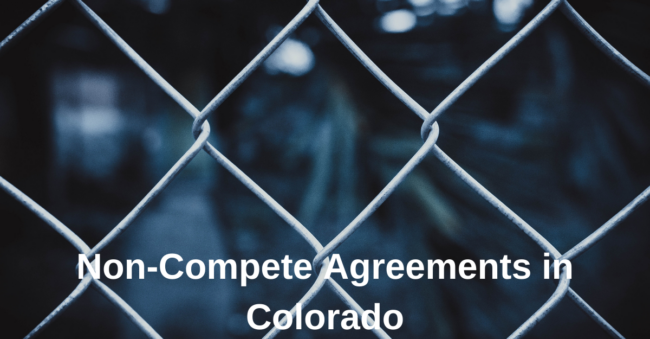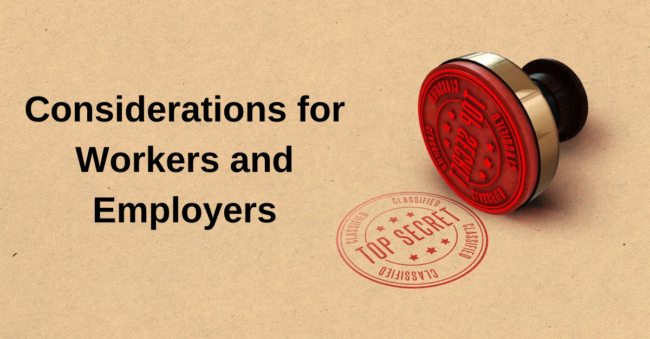
Non-compete agreements in Colorado, often referred to as restrictive covenants, play a significant role in the state’s employment landscape. A non-compete Colorado agreement is a contractual arrangement between an employer and an employee, where the employee agrees not to engage in certain competitive activities after leaving their current position. These agreements aim to protect the employer’s legitimate business interests, such as trade secrets, confidential information, and client relationships.
In Colorado non-compete agreements are governed by specific statutory requirements. As of my knowledge cutoff in September 2021, the state had adopted a more stringent approach to non-compete agreements than many other jurisdictions. The Colorado Revised Statutes (C.R.S.) provide guidelines regarding the enforceability of such agreements. One key aspect is that non-compete Colorado agreements must be supported by valuable consideration, meaning the employee must receive something of value, such as a promotion, specialized training, or access to proprietary information, in exchange for their agreement to the restrictions.
4 Types of Non-Compete Agreements
There are various types of non-compete agreements that can be utilized in Colorado to protect the legitimate business interests of employers. These non-compete Colorado agreements can be tailored to specific industries, job positions, and circumstances. Here are a few common types of non-compete agreements:
- Employee Non-Compete Agreements: This type of agreement is entered into between an employer and an individual employee. It restricts the employee from working for a direct competitor or starting a competing business within a certain geographical area and timeframe after the termination of employment. These agreements typically aim to safeguard the employer’s trade secrets, confidential information, and customer relationships.
- Business Partnership Non-Compete Agreements: When individuals enter into a partnership or establish a business together, they may include non-compete provisions in their partnership agreement or other contractual arrangements. These provisions prevent partners from competing against the partnership or engaging in similar business ventures that would undermine the partnership’s interests.
- Sale of Business Non-Compete Agreements: When selling a business, the seller may include non-compete clauses colorado in the sale agreement to prevent the buyer from establishing a competing business in the same market or geographic area. These agreements help protect the value of the business being sold by ensuring that the seller’s goodwill and customer base are not immediately exploited by the buyer.
- Independent Contractor Non-Compete Agreements: Independent contractors, who are not considered employees, may also be subject to non-compete agreements in Colorado. These agreements can restrict independent contractors from working for competitors or engaging in similar business activities that would be detrimental to the contracting party.
The Summary of the Colorado’s Non-Compete Statute
Colorado’s non-compete statute, found in the Colorado Revised Statutes, establishes guidelines and requirements for the enforceability of non-compete agreements in the state. The non-compete Colorado statute sets forth specific provisions that employers and employees must adhere to when entering into such agreements.
Under the statute, non compete agreements in Colorado must be supported by valuable consideration, meaning that employees must receive something of value in exchange for their agreement to the restrictions. This consideration can take various forms, such as a promotion, specialized training, access to proprietary information, or other benefits.
The statute also emphasizes the importance of reasonableness in non-compete agreements. Non-compete Colorado agreements must be reasonable in terms of their duration, geographic scope, and the types of activities they prohibit. The purpose of this requirement is to strike a fair balance between protecting the employer’s legitimate business interests and preserving an employee’s ability to find suitable employment within the state.
Geographical and temporal reasonableness is still necessary for non-compete agreements.
In Colorado, despite the existence of a non-compete statute, non-compete agreements must still meet the requirement of being geographically and temporally reasonable to be enforceable. While the statute provides guidelines and establishes general principles, the courts in Colorado continue to emphasize the importance of reasonableness in non-compete agreements.
Geographical reasonableness refers to the scope or extent of the restriction on an employee’s ability to compete. A non-compete Colorado agreement that imposes overly broad restrictions, encompassing an unreasonably large geographic area, may be deemed unenforceable. The court will consider factors such as the nature of the employer’s business, the geographic area in which it operates, and the employee’s role and access to confidential information when evaluating the reasonableness of the geographic limitation.
Penalties for Employers in Criminal and Civil Cases
In Colorado, employers who violate the non-compete statute may face both criminal and civil penalties. The state takes non-compete Colorado agreements seriously and has mechanisms in place to enforce compliance.
Criminal penalties can be imposed when an employer knowingly requires an employee to enter into a non-compete agreement that violates the statutory requirements. Violating the statute in this manner is considered a misdemeanor offense. If found guilty, the employer may be subject to fines and other criminal sanctions as determined by the court.
Employers who fail to comply with the non-compete statute may face civil penalties through legal action initiated by the affected employee. An employee who has been subject to an unenforceable non-compete agreement can file a lawsuit seeking damages resulting from the agreement’s violation. The court may award the employee financial compensation for losses suffered due to the employer’s non-compliance.
Factors to be taken into account by Employees and Employers

When discussing considerations for workers and employers, one important aspect to address is the issue of non-compete agreements in Colorado. Non-compete agreements are contractual agreements between employers and employees that restrict employees from working for a competing company or starting their own competing business for a certain period of time, usually after leaving their current employment. It is crucial to understand the legal framework and implications of non-compete agreements in Colorado to ensure fairness and protection for both parties involved.
For workers in Colorado, it is essential to be aware of the rights and limitations imposed by non-compete agreements. The state of Colorado has specific laws governing non-compete agreements to strike a balance between protecting employers’ legitimate business interests and safeguarding employees’ ability to seek employment and engage in their chosen profession. According to Colorado law, non-compete agreements are disfavored and can only be enforced if they meet certain criteria, such as being supported by valuable consideration and being reasonable in terms of duration, geographical scope, and the scope of activities restricted.
FAQs
Is a noncompete enforceable in Colorado?
In Colorado, the enforceability of non-compete agreements is governed by specific legal requirements. While non-compete agreements are not outright prohibited in Colorado, they are subject to scrutiny and must meet certain criteria to be enforceable. Colorado law recognizes the need to balance the protection of employers’ interests with employees’ ability to seek new employment and engage in their chosen profession.
To be enforceable in Colorado, a non-compete agreement must meet several criteria. First, it must be supported by valuable consideration, which means the employee must receive something of value in exchange for agreeing to the restrictions. This could include monetary compensation, access to proprietary information, or specialized training.
Second, the non compete agreement Colorado must be reasonable in its restrictions. This includes considerations of duration, geographical scope, and the scope of activities restricted. The restrictions imposed must be no greater than necessary to protect the employer’s legitimate business interests. For instance, a non-compete agreement that prohibits an employee from working in the same industry throughout the entire state of Colorado for several years may be considered overly broad and unreasonable.
How do I get out of a non-compete agreement in Colorado?
To address your concern about a non-compete agreement in Colorado, it’s important to understand that non-compete agreements are enforceable in Colorado under certain conditions. There are potential avenues to explore if you wish to be released from a non-compete agreement in Colorado.
- Review the terms: Carefully examine the non-compete agreement to understand its scope, duration, and geographic restrictions. Ensure that it aligns with Colorado’s laws governing non-compete agreements, as they must be reasonable in terms of duration, geographic area, and scope of activities to be enforceable.
- Seek legal advice: Consult with an experienced employment attorney in Colorado who can assess the specifics of your situation. They will evaluate the enforceability of the non-compete agreement and provide guidance on potential courses of action based on Colorado law.
- Negotiate with the employer: Open a dialogue with your employer to discuss your concerns and explore the possibility of modifying or terminating the non-compete agreement. Explain your reasons for seeking a release and how it may benefit both parties. Employers may be willing to negotiate if they perceive a mutual benefit or if the non-compete is deemed overly restrictive.
- Prove unenforceability: If you believe the non-compete agreement is unenforceable under Colorado law, gather evidence to support your case. Factors such as an unreasonable restriction on your ability to earn a living, lack of consideration, or a violation of public policy may render the agreement unenforceable.
- File a lawsuit: If negotiations fail and you strongly believe the non-compete agreement is invalid or unenforceable, you can file a lawsuit in a Colorado court. An attorney can guide you through this process, represent your interests, and argue for the agreement’s unenforceability.